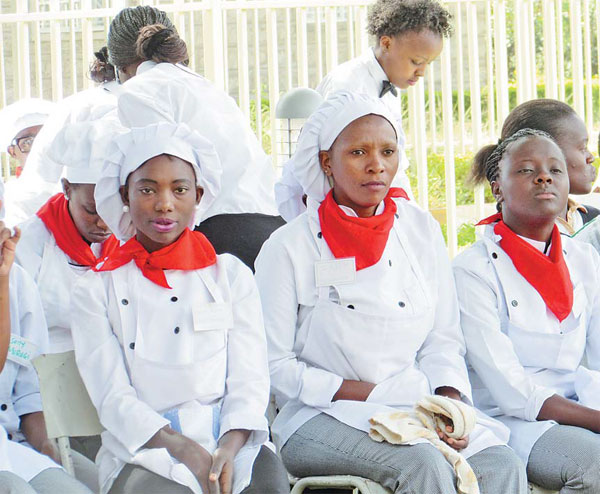University abuzz with Lunar New Year
Celebrations mark growth of Confucius Institute at college
The Confucius Institute at Kenyatta University marked the annual Chinese Spring Festival in style on March 4.
Students from the School of Hospitality and Tourism Management, together with students of Chinese language and culture from the Confucius Institute, gathered at the university, located on the outskirts of Nairobi, to celebrate the holiday.
|
Hospitality students from Kenyatta University in Nairobi attend a Spring Festival gala on campus. Photos by Philip Etyang / For China Daily |
Stage performances, including Chinese songs, poems and martial arts, were staged at the event, which was attended by Yao Ming. the counselor for press and consular affairs at the Chinese embassy in Nairobi. Chinese cuisine, including dumplings, was served to guests.
The use of chopsticks, Chinese calligraphy, martial arts, paper cutting, ping-pong, music and dance was performed by students from both the School of Hospitality and Tourism Management and the Kenyatta University Confucius Institute at the event.
Professor Ruth Ndungu, the registrar in charge of corporate affairs and who was representing Vice-Chancellor Professor Olive Mugenda at the event, sent messages of goodwill from Mugenda to the Chinese faculty at the Confucius Institute.
Ndugu said she was amazed to see how much the Confucius Institute had grown over the years since its establishment in December 2008. She said she was the first director of the institute. Ndungu is also a professor of English, having undertaken her studies at Kenyatta University.
"As I stand here, I am filled with a lot of nostalgia as I was the first director of the Confucius Institute when it started. I appreciate the work that has been done by the people who took over from me. Under their leadership, the institute has grown tremendously," she said.
Professor Martin Njoroge, also from the English department of KU, succeeded her. There are currently two directors: Milcah Chokah from Kenya and Professor Wu Shengzheng from China.
"We want to acknowledge the fact that learning the Chinese language has made us appreciate the culture of the people and that their presence in the country has helped spur bilateral ties between the two developing countries," she said.
Professor Li Jing, a faculty member at the Confucius Institute, took the opportunity to explain to guests the events that traditionally occur during the Spring Festival.
"Spring Festival is the most important time for Chinese people across the world. It is a time when families come together to share food and gifts. People stay up late chatting and start eating dumplings at midnight. They also take time to visit friends and relatives," she said. Emmah Wangari, a student from the university, performed a Chinese song titled Wo De Ge Sheng Li (Inside My Song) to a cheering crowd of students, while Christine Ngendo and Loise Wangui Ngugi belted out Wo Zhi Dao (I Know).
Dong Qimin, a music teacher at the Confucius Institute, performed the famous Chinese song Mo Li Hua (Jasmine Flower) on the pipa, while two martial arts students, under the instructions of Ma Yulong, performed a drill that received overwhelming applause from the guests.
Professor Kisovi, in his speech, appreciated the positive role that Confucius Institutes worldwide were playing in bridging the gap between China and the world. He said the role was very important because Chinese is a United Nations language and learning it gives students an edge in the job market.
"China is a global power in terms of knowledge and having Kenyans who can competently engage and work side-by-side with the Chinese is strategically important for a developing country like Kenya," he said.
Professor Alice Ondigi said Kenyatta University's Confucius Institute should strive to strengthen link with China in the tourism and hospitality sector, as it is a major component of the Kenyan economy. She said strengthening it will strengthen both countries, which are still developing.
Professor Wu said the Spring Festival has been celebrated for over 4,000 years and is the most important traditional festival in China and it is marked in Korean Peninsula, Japan, Thailand, Singapore, Indonesia and Malaysia.
"The celebration of the Spring Festival in Kenya symbolizes the ever-growing friendship and ties between China and Kenya," he said.
Yao, who has been in Kenya for only two months, said some countries had embraced the Spring Festival and made it an official holiday.
"The interaction and understanding between the Chinese and Kenyan people has increase tremendously over the years. This has opened an opportunity for both China and Kenya to work closely and achieve future development goals," he said.
Yao said Kenya President Uhuru Kenyatta has proposed to transform Kenya into a highly industrialized country by 2030.
"There are numerous examples of cooperation between China and Kenya that should be further nurtured and enhanced to ensure that the achievements of our two countries bring more opportunities to citizens of both countries," he said.
The Kenyatta University Confucius Institute was established in December 2008 following agreements between Kenyatta University, Shandong Normal University in China and the office of Chinese Language Council International.
The Egerton University Confucius Institute had earlier marked the Chinese Spring Festival by partnering with the Lions Club of Nakuru to hold a free eye clinic at the university's main campus in Nakuru County.
Kenya now has three Confucius Institutes in Kenya: the Confucius Institute at the University of Nairobi, Confucius Institute at Kenyatta University and the Confucius Institute at Egerton University.
For China Daily



















